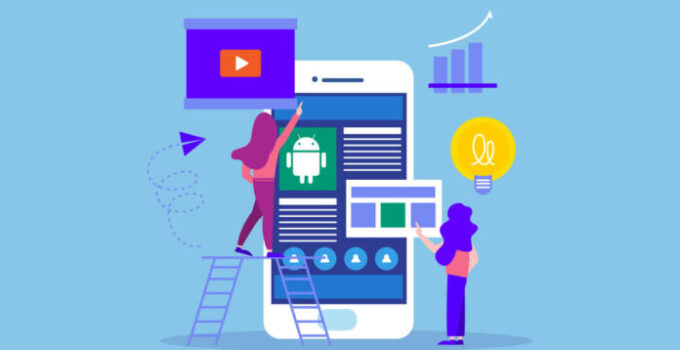Look around yourself and see how trends are developing. Observe how as we move towards a post-digital age, technology keeps exploring new boundaries, and the potential keeps increasing. With conversations around the Metaverse and Web 3.0 (Web3) everywhere – the demand for developers and businesses to keep up with the pace is growing.
Be ahead and learn how you can strategically implement Android app development into the product design process.
Figures show us that Android has a 73% share of the global mobile market and that number is projected to grow further in the upcoming years.
Before you decide to hire an Android application developer for your business, first you need to know everything about the platform’s benefits and the essential tools used by business to create robust applications.
Why Choose Android?
From a developer’s perspective, there is always support from every end. There are over 3 million apps on the Google Play Store. If we judge by what the numbers say and plan our business plans accordingly, it should be accounted that Google powers Android.

Source: rolustech.com
Most consumers use Android, which is easily accessible, covers a broad range of devices, and holds substantial influence. Your next client or partner likely uses an Android device. And with such a large audience, finding resources is easy, and overall – the development cycle is more leisurely.
With Android, finding solutions to a problem is not as tricky – there are communities online to help out. We suggest you think from a business standpoint and come to a conclusion.
Following are the benefits that explains how Android apps can help your digital needs, operational concerns, and ROI goals.
An open-source environment
For developers, collaborating and finding compatible code takes time – with Android SDK, the process is transparent, and there is more room for ideas and cross-functionality. There is autonomy over projects, and the source code can be easily shared in case of an error or a potential bug.
A flexible and collaborative SDK where security remains intact, and creativity is encouraged. Build a customizable solution and make changes quickly on the go. The goal is to make Android apps better. Everyone is involved – developers, end-users, device manufacturers, and support from Google is involved.
Business-friendly
Integrating an Android app into their ecosystem is seamless and barely takes time for startups and other businesses. With Android, separate tools act as a sub-version, depicting the core message.
With an emphasis on app customization and the ability to include business-friendly features, it is easily integrable with existing websites. An app will add to your digital presence; consider it a plus point.
Cost-effective

Source: monday.com
Android Studio is a free-to-use IDE that is powered by Google, open for developer communities to discuss, contribute, and use the tool to create digital products. No third-party interference or license-related issues are involved here, assuring a straightforward process.
The ROI compared with the productive use of Android Studio is unmatched and is a definite plus point for businesses. While evaluating a business, remaining under a set budget will help.
Adaptable and Customizable
Android applications depend on Java, and the language is currently used by millions of developers, being the premium option. With the help of Java, it is easy to take applications to different platforms like Ubuntu and Symbian.
And more than Java, develop an Android apps are heavily dependent on Kotlin now – it was officially released by Google to help developers work with better frameworks – an eventual replacement for Java. You can check more information on https://www.tekrevol.com/.
Wide range of people
As mentioned earlier, many stakeholders are in the Android ecosystem. Both developers and end-users are significant in terms of demographics and the geographical ranges from North America to Australia – covering the entire globe.
An Android-based application has the potential to reach a wider audience and impact more lives; unlike iOS, where exclusivity matters, Android appeals to the masses. There’s a reason why a 73% market share exists.
Enhanced security

Source: techcircle.in
Android P has introduced various built-in features for robust security measures against viruses and malwares. Hence, Android apps are particularly well-known security and reliability.
You can always consult the best practices for security and privacy which organizations use to craft the right approach for the software development lifecycle.
Android Application Development: Tools Needed
To create a productive environment where development cycles are consistent, quality is maintained, and the overall workflow goes smoothly – here are the tools you need to be ahead:
- Android Studio
- AVD Manager
- Instabug
- Unity 3D
- Android Debug Bridge
- Android SDK
- Eclipse
From exclusive game development with Unity 3D to simply managing all kinds of emulations for different Android devices with AVD Manager – each tool has a separate set of features that can help you speed up the development journey.
Your app should be responsive enough and display a robust interface and features that help the user get a better experience. A mobile development Houston company is responsible for using the necessary tools.
Steps to Follow

Source: simplilearn.com
It might seem overwhelming but trust us, once you have a clear-cut strategy planned out for everyone to follow where phases are distinctively defined, the roadmap becomes clear. Here’s what you should follow:
- Research and Development (Ideation)
- UX/UI Design Layout
- Development Phase
- QA Testing
- Launch
- Improvement Stage
That is about it. A simple 6-step procedure where each stage should have dedicated resources and acknowledge that it will take time – consistency is required.
Final Thoughts
Lastly, we understand that businesses need to know the estimated budget and what the financial impact of an app will be. When it comes to the cost breakdown, there is no “one” exact figure – many factors play a role.
We recommend that when you set out to hire an Android application developer, do enough survives and see what fits in your budget while meeting your project quality standards.
The cost of a mobile app usually depends on the following:
- UX/UI Design
- Features Incorporated
- Backend Functions
The cost can keep building up depending on the app’s complexity, real-time processes, and custom animations.




